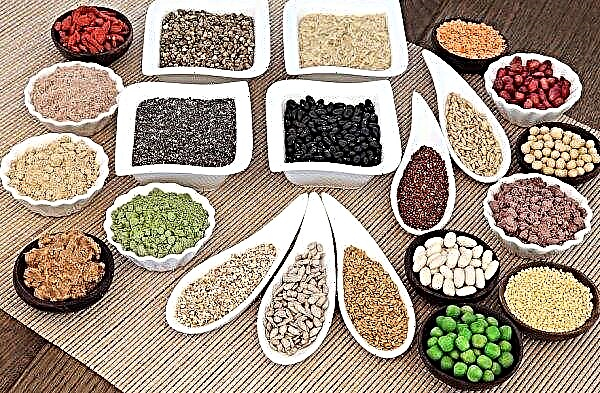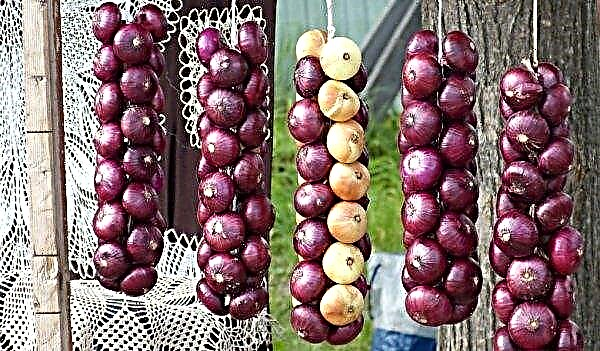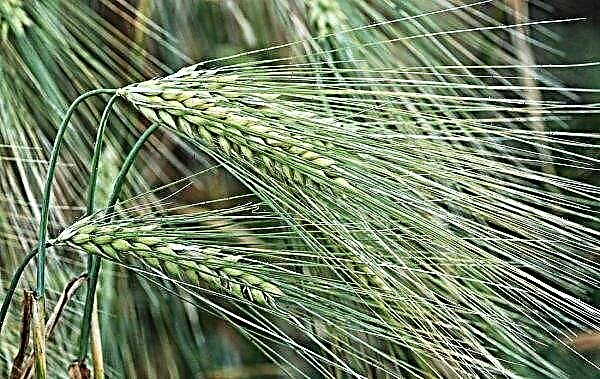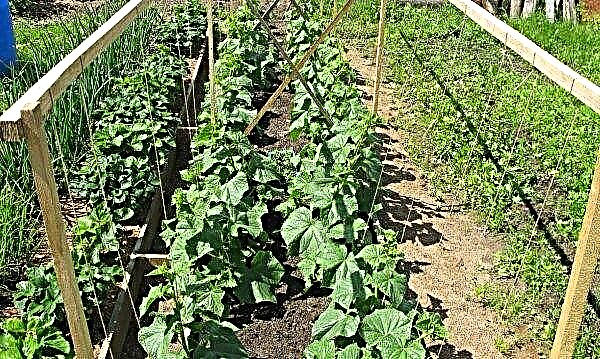Dill, as one of the most affordable and fragrant seasonings, is successfully used not only in cooking, but also in alternative medicine as a medicine and prophylactic for various ailments. Greens has amazing healing properties, and is especially effective in the treatment of gastrointestinal diseases. How to consume dill for the treatment of gastritis and in what cases it can be harmful, let's figure it out.
Chemical composition
Dill is considered one of the most popular spices, the chemical composition of which can be safely called a storehouse of a whole complex of active biological substances, micro and macro elements.
The main components of the plant are:- vitamin A: required for the growth and proper development of new cells, regulates protein synthesis, normalizes metabolic processes;
- vitamin e: has antioxidant properties, prevents premature aging of the body, protects cells from the negative effects of free radicals;
- vitamin C: improves the protective properties of the human body, helps strengthen the immune system;
- vitamin P: repeatedly strengthens the walls of blood vessels, prevents blood clots, participates in the regulation of blood pressure;
- calcium: required for strengthening and building bone and muscle tissue, regulates hematopoiesis, contributes to the correct formation of the skeleton;
- potassium: ensures the proper functioning of soft tissues, improves the functioning of the cardiovascular system, has an anti-sclerotic effect;
- magnesium: takes part in all biochemical processes, is responsible for the stable operation of the heart muscle, normalizes the functioning of the nervous system;
- iron: provides tissue with oxygen, prevents the development of iron deficiency in the blood, normalizes metabolic processes;
- manganese: struggles with free radicals, takes part in the synthesis of fatty acids, improves the immune system, regulates blood sugar.
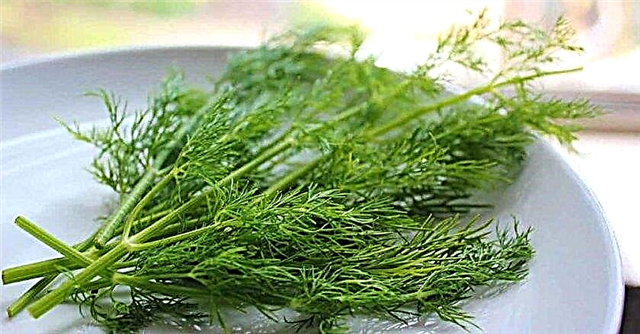
The chemical composition of the herb is supplemented with essential oils, fiber, essential and non-essential acids. In addition, dill contains easily digestible carbohydrates, which are quickly burned during the life process and are not deposited in the form of adipose tissue. The plant is considered low-calorie, excellent as one of the main seasonings for weight loss.
Did you know? Dill loses its refined aroma during heat treatment, which is why it is recommended to add seasoning to ready-made dishes to preserve the smell.
The properties of dill for the human body
This umbrella plant has a number of useful qualities, however, for some categories of people, its consumption can harm the body.
Benefit
The benefits of umbrella grass are due to its multifaceted chemical composition. Thanks to a harmonious combination of unique components, it has a sedative, antispasmodic, antimicrobial, restorative, expectorant effect, and allows the functioning of many body systems.
- Dill seeds and greens are used for:
- normalization of digestion, improvement of the digestive tract;
- increase in appetite;
- struggle with insomnia;
- normalization of the cardiovascular and nervous system;
- vision improvement;
- blood pressure adjustment;
- with problems with increased acidity of the stomach;
- prevention and treatment of constipation and diarrhea;
- increase potency;
- normalization of the level of "female" hormones.

Spice also allows you to maintain the youthfulness of the body, prevents the appearance of wrinkles on the skin, improves cell regeneration, cleanses of toxins and harmful substances. Useful properties of the plant help to combat diseases such as gout, cholelithiasis, cataracts, glaucoma, headaches, bronchitis.
Harm and contraindications
- Do not forget that, like any other medicinal plant, dill has a number of contraindications for use:
- pregnancy, especially the first trimester;
- individual intolerance and the presence of allergic reactions to essential oils;
- hypotension;
- atony - an ailment characterized by a sharp drop in the tone of the internal organs and muscles of the skeleton;
- the accumulation of large stones in the bladder and gall bladder.
The effect of dill seeds on various types of gastritis
One of the most common forms of gastrointestinal ailments is gastritis - an inflammatory disease of the gastric mucosa, a frequent symptom of which is the presence of pain in the upper abdomen. In addition, gastritis can be accompanied by heartburn, nausea, headache, and general malaise. To alleviate the condition, various medicines are used, as well as natural remedies, in particular, dill seeds and greens.
In this case, several types of ailment are distinguished: gastritis with low and high acidity. Dill effectively helps combat discomfort in both cases. Repeatedly, the effectiveness of plant seeds has been proven in gastritis with high acidity. Getting into the digestive tract, they help the proper flow of metabolic processes, normalize the level of acidity, and reduce symptoms of heartburn.Important! Adhering to the necessary dosages and terms of treatment, dill will not be able to harm the body. However, before using it for medicinal purposes, you must always consult a doctor.
Moreover, the seeds facilitate the digestion process, especially when it comes to heavy fatty foods. Regular consumption of dill for this disease makes it possible to minimize pain and discomfort, and most importantly, to prevent the development and aggravation of the disease.
Infusions and decoctions from dill seeds bring benefits with reduced gastric secretion. They help to organize a regular daily stool, normalize the level of acidity, speed up metabolic processes, improve the functioning of the pancreas. Means allow you to activate the production of secretion, have anti-inflammatory and enveloping effects.
Important! Dill has the ability to increase the secretion of the stomach, which leads to an increase in acidity. That is why, in the treatment of gastritis with different degrees of acidity, the dosage should be strictly observed, especially if the ailment proceeds as an increased secretion.
Consumption rates
In the treatment of gastritis with high and low acidity, special attention must be paid to the concentration and dosage of funds prepared on the basis of dill. Traditional medicine offers many different recipes to combat the disease. Seed consumption rates will depend on the type and stage of the disease and are determined individually in each case.
As a rule, for gastritis occurring with high acidity, decoctions and infusions prepared with the addition of a small amount of dill grains are used for therapy. With reduced secretion, they are treated with powdered seeds or decoctions with a high concentration of raw materials.
How to use dill for gastritis
Of course, the treatment of gastritis should be comprehensive, with the mandatory observance of a special diet. Funds prepared on the basis of dill seeds are not a drug that can completely cure an ailment, they serve as supportive therapy to alleviate the patient's condition and prevent further development of the disease.
Before deciding on the use of dill for the treatment of gastritis, it is necessary to consult with your doctor and determine whether it is possible to eat seeds with certain forms of the disease.With gastritis with high acidity
- The following infusion helps to reduce inflammation of the stomach and reduce secretion: 2 tsp. chopped dill or 1 hour of seeds pour 500 ml of hot water, insist in a thermos for 30 minutes. Take according to the scheme: 1/3 cup funds three times a day before meals.
- You can also reduce uncomfortable sensations by using this mixture: 1 teaspoon of dill juice mixed with 1 teaspoon of honey. Consume 1 hour before meals.
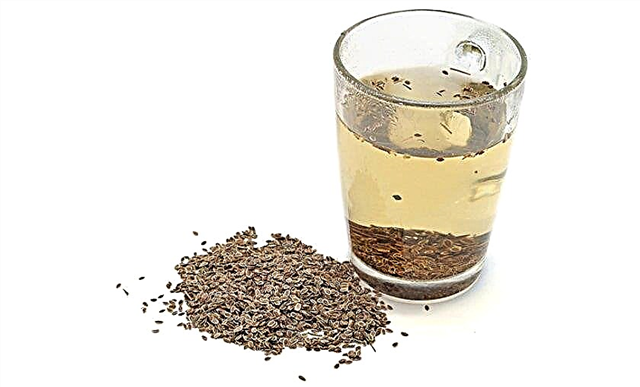
With gastritis with low acidity
- To solve the problems with the gastrointestinal tract, the following recipe will help: grind the seasoning seeds into powder using a coffee grinder. Take 0.5 teaspoon of powder during a meal with a small amount of water.
- Effective with the disease is a decoction: 1 tbsp. add seeds to 1 cup boiling water, bring to a boil, set aside for 30-40 minutes. Strained broth to drink 0.5 cups 3-4 times before meals, adding a little honey.
Dill is an affordable, tasty and extremely aromatic seasoning, which not only decorates and complements the taste of any dish, but also serves as an excellent drug for the prevention and treatment of gastritis. Depending on the concentration, the grass allows you to reduce or increase the secretion of the stomach, improve digestion, normalize the functioning of the gastrointestinal tract, relieve the patient of unpleasant, painful sensations, prevent further development and aggravation of the disease.Did you know? In ancient times, dill was grown for a long time as an ornamental plant. Bouquets of it were given to girls, and the smell of grass competed even with the sweet scent of roses.





